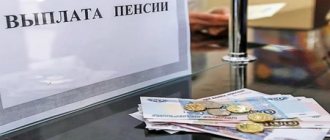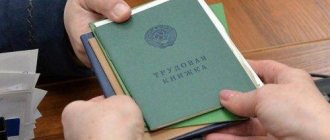Many citizens are interested in aspects of inheriting a pension, and they ask lawyers the question: “Is it possible to inherit the pension savings of, for example, a relative?” Few people know that if a relative who officially worked suddenly died, then the loved one has the right to inherit the pension accumulated over the years by the deceased.
Today, you can inherit not only real estate, a car, jewelry, but even a pension. And if most Russian citizens understand everything about a car and an apartment, then almost no one knows how to inherit a pension. From this article you will find out whether it is possible to inherit a pension and how the inheritance of pension savings is formalized, and we will also deal with the following questions: what types of pensions can be inherited; how a voluntary pension is inherited; how to inherit a state pension; who has the right to become an heir to pension savings; what is the payment scheme for pension savings that were inherited.
To begin with, let’s outline the types of pension savings that can be inherited:
- Cumulative part of the labor pension;
- Cash from a state pension that the pensioner did not receive during his lifetime. In this case, it does not depend on the type of pension;
- Pension savings in non-state pension funds, which were carried out voluntarily by a citizen.
Let's consider each of these points in detail.
Inheritance of an assigned state pension not received by pensioners during their lifetime
The exercise of the right to state provision of a pension in Russia is associated with the establishment and payment of various types of state pensions:
- Due to disability.
- Due to old age.
- For years of service.
- Social pensions.
- On the occasion of the loss of a breadwinner.
Depending on the social risks that have occurred (they can be very different), a specific type of state pension provision is provided:
- death of both parents;
- approaching retirement age;
- loss of a breadwinner in the event of his death;
- disability;
- other social risks.
There are a number of facts that are significant from a legal point of view when payment of a certain type of pension is terminated:
- the citizen's disability group was removed;
- the citizen receiving a pension has died;
- a citizen has the opportunity to change one type of pension provision to another.
Legal practice shows that today the problem associated with the inheritance of unpaid pension amounts in the event of the death of the person who received it does not lose its relevance.
Issues of pension provision are regulated at the legislative level, and provisions on the inheritance of pension funds in the event of the death of a citizen are enshrined in the Federal Law of December 17, 2001.
If we turn to Article 23 of this law, it states that the accrued amounts of labor pension that were due to the pensioner in the current month, but which he did not receive due to sudden death in the same month, will not be included in the inheritance.
These inherited amounts will be paid to those members of his family who belong to the persons specified in paragraph 2 of Article 9 of Federal Law No. 173-FZ. But here the condition must be met that they lived under the same roof with the deceased pensioner on the day of his death. This rule “works” if the application for unreceived pension funds was no later than before 6 months have expired from the day the pensioner died.
If several family members apply for the specified inherited pension amounts, then the amounts of the labor pension to which they are due will be divided among them in equal proportions.
According to paragraph 2 of Art. 9 of the Federal Law, persons who have the right to inherit the pension savings of a deceased citizen include disabled family members. These include:
- Sisters, children, brothers, grandchildren of the deceased breadwinner, whose age has not reached 18 years. That is, minors.
- Children, sisters, grandchildren, brothers of the deceased breadwinner, who are studying full-time in educational institutions of all types and types, regardless of their organizational and legal form, until they complete their studies, but no longer than before they turn 23 years old. The exception is educational institutions of additional education.
- Children, grandchildren, sisters, brothers of the deceased breadwinner are older than this age, if before reaching adulthood they were assigned the status of a disabled person who has limited ability to carry out full-time work activities. But there is one “but” here: the family members of the deceased pensioner-breadwinner listed above are recognized as disabled if they do not have parents engaged in working activities.
- The spouse, one of the parents or grandparents of the deceased breadwinner (in this case, ability to work and age do not play a role), as well as the sister, brother or child of the deceased breadwinner who are already 18 years old, if they are caring for children, sisters, brothers, grandchildren of the deceased breadwinner who are under 14 years of age and are entitled to a labor pension in the event of the loss of a breadwinner in accordance with paragraphs. 1 of this paragraph and do not carry out labor activities.
- The grandmother of the deceased breadwinner, whose age has reached 55 years, and the grandfather of the deceased breadwinner, whose age has reached 65 years, or they are disabled people who have limited ability to work. But here the condition must be met that they do not have persons obligated to take them into custody in accordance with the legislative framework of the Russian Federation.
- The spouse and parents of the deceased breadwinner who are 55 years old (if a woman) and 60 years old (if a man), or have been legally assigned the status of a disabled person who has limited ability to work.
On March 1, 2002, Part 3 of the Civil Code of the Russian Federation came into force, which regulates, in particular, issues regarding inheritance.
If we turn to Article 1183 of the Civil Code of the Russian Federation, it says that the right to receive amounts not received by the testator during his lifetime, including pension savings, belongs to his family members who lived together with the deceased pensioner. Also, this right belongs to his dependents who are recognized as disabled, regardless of whether they lived separately with the breadwinner or under the same roof.
Persons entitled to it must submit these claims for inheritance within 4 months from the day the inheritance was opened. And if there is no real possibility of receiving amounts that were not paid to the deceased testator, or the persons mentioned above did not make demands for payment of the agreed amounts within the period established by law, then the corresponding amounts will be included in the inheritance and inherited on a general basis.
In what cases can you not inherit a pension?
There are two situations in which a funded pension cannot be inherited:
- Payments of pension savings are not due to relatives if the testator received part of the insurance pension during his lifetime.
- Use of maternity capital - if it was allocated to the funded pension of the child’s mother, then after the woman’s death the baby’s father can receive it. If it is not there, then payments are due to young children. As for adult children, they can count on pension payments when completing full-time studies at a university. The rule applies until the child graduates or reaches the age of 23.
In the absence of such persons, savings are inherited in the general manner. But the amount of maternity capital is returned back to the deposit account in the Pension Fund. In other words, the pension is not inherited by the relatives of the deceased citizen.
Inheritance of the funded part of the labor pension
Let's figure out what the inherited funded part of a labor pension is?
Many of you already have an idea that since 2002, the labor pension consists of three parts:
- The funded part of the pension;
- Basic;
- Insurance part of pension.
It is important to know that the insurance and basic parts of the labor pension cannot be inherited. That is, only the funded part of the insured citizen’s labor pension is inherited. [offer] When the new pension legislation came into force on January 1, 2002, the employer began to transfer insurance contributions to the employee, information about which is accumulated on the individual personal account of the insured person in the savings and insurance parts.
The funded part of the labor pension was formed over a 3-year period, from 2002 to 2004, but only for women born in 1957 and younger, and males born in 1953 and younger. Starting from January 1, 2005, the formation of the funded part of the pension is carried out for citizens born in 1967 and younger, as well as individual entrepreneurs whose age does not matter, but who paid insurance contributions for the funded part of the pension before May 24, 2005.
In accordance with the Federal Law of April 30, 2008 No. 56-FZ “On additional insurance contributions for the funded part of the labor pension and state support for the formation of pension savings”, starting from 01/01/2009, the formation of the funded part of the labor pension also occurs for all citizens who on a voluntary basis, they have become participants in the state co-financing program and are paying additional insurance contributions for the funded part of their labor pension. This program is popularly called “a thousand per thousand.”
The funds of the inherited funded part of the labor pension are formed from:
- Funds that the employer transfers to the individual personal account of the employee during his life only for the funded part of the labor pension;
- Income from investment activities related to the placement of these funds.
The funds that are contributed to the funded part of the labor pension, subject to inheritance, are located in the non-state pension fund (NPF) or in the Pension Fund of Russia (PFR).
How is the funded part of the labor pension located in the Pension Fund of Russia inherited?
If the insured person died before he was assigned the funded part of his labor pension, then his heirs have the right to receive pension savings, which are recorded in a special part of his individual personal account.
It is important to know! Inheritance of the funded part of the pension can occur only when the following cases occur:
- if the citizen to whom it should be paid has not lived to see this moment;
- the citizen died after taking a well-deserved retirement, but has not yet managed to receive a pension or applied for it even once;
- the citizen died before reaching the retirement age.
But if a person has received a pension at least once, then it can no longer be inherited.
There is no injustice in this principle of inheritance - the insurance principle simply works here. The funded part of the pension is paid to the person until the end of his days, just like the labor pension in general. Simply put, citizens who lived after retirement age less than the average lifespan in retirement (this is called the survival period of 19 years after entering a well-deserved retirement), in fact, pay for those who will live more than 19 years after retirement .
In accordance with Article 38 of Federal Law No. 111-FZ dated July 24, 2002 “On investing funds to finance the funded part of labor pensions in the Russian Federation” (as amended on February 2, 2006), pension savings are used to make, in particular, payments to in the event of the death of the insured person, the citizens (heirs) specified in clause 6 of Art. 16 of the Federal Law “On Labor Pensions in the Russian Federation dated December 17, 2001 No. 173-FZ (as amended on July 22, 2008).
According to Article 39 of Federal Law No. 111-FZ, financing of payments to the legal successors of deceased insured citizens is ensured by transferring each month by the management company amounts of money in the established amount to Pension Fund accounts opened in institutions of the Bank of Russia or territorial bodies of the Federal Treasury in accordance with the Budget Code of the Russian Federation. And if there are no Bank of Russia institutions, then to accounts that are opened in credit institutions selected in the manner determined by the Government of the Russian Federation, and intended exclusively for making payments to the heirs of deceased insured citizens.
At the same time, the insured person has the right at any time to identify specific heirs from among those indicated in clause 6 of Art. 16 of the Law on Labor Pensions (No. 173-FZ) or from among other persons to whom this inherited payment can be made by submitting a corresponding application to the Pension Fund of the Russian Federation. In addition, the insured person has the right to determine in what shares the above funds should be distributed between them. If this application has not been submitted, then the inherited funds that were accounted for in a special part of the individual personal account, subject to payment to the heirs of the insured person, will be distributed in equal shares between them.
When the pension reform was just gaining momentum, a scheme for paying the heirs of the mentioned funds was not developed, therefore all payments upon requests from the heirs, in most cases, were made on the basis of a decision of the judicial authorities. But on November 3, 2007, the Government of the Russian Federation adopted Resolution No. 741 “On approval of the Rules for the payment by the Pension Fund of the Russian Federation to the legal successors of a deceased insured person of pension savings accounted for in a special part of the individual personal account,” according to which a mechanism was determined for the payment of pension savings to legal successors (heirs) insured citizens, the formation of the funded part of their labor pension at the date of death was carried out through the Pension Fund of the Russian Federation.
Who is entitled to pension payments?
The legislator gives priority in inheriting savings to family members of a deceased citizen who lived with him in the same residential premises. At the same time, the testator’s dependents also have the right, regardless of their place of residence. If such persons are absent or do not declare their rights within the established time frame, monetary payments are inherited on a general basis. The burden of proving the fact that the testator is dependent lies on the interested parties. Read about what evidence is needed, what to do and where to go in our article “Inheritance by dependents of the testator.”
Pension funded pensions are based on:
- spouse - as a family member;
- parents and children of the deceased (Article 2 of the RF IC).
Minor family members may be the deceased's natural children, or adopted children. The basis is a birth or adoption certificate as of the date of death.
Example:
Kalinin S.V. made contributions to a non-state PF for a long time. The man was forming a funded pension. The family of citizen Kalinin consisted of 4 people - he, his wife and two young children. The man died at the age of 48. During his lifetime, he did not have time to make a statement about the distribution of savings. As of the date of death, the man had not received a single payment. The composition of the heirs is the wife, children and mother of the deceased person. However, my mother refused to receive the payment. The pension amount was divided equally between the three heirs - 1/3 of each.
Let us recall that during his lifetime the testator can submit a corresponding application to the Pension Fund of the Russian Federation, indicating in it specific citizens who can receive pension savings after his death. If such a document is available, the beneficiary can be any person - even an outsider.
How the Pension Fund pays pension savings by inheritance
Speaking about whether it is possible to inherit a pension and how the inheritance of pension savings is formalized , it should be understood that the payment of pension savings by inheritance is carried out after submitting the appropriate application. The heirs must have time to contact the territorial office of the Pension Fund of the Russian Federation within six months from the date of death of the testator. After this period, only in court can relatives restore their right to apply for payment.
In accordance with the legislative framework, the decision on additional payment is made by the Pension Fund no later than July 31 of the year following the year of death of the insured citizen. In this case, legal successors (heirs) will be sent by mail copies of decisions on additional payment of pension savings. Funds will be transferred by August 15 of the corresponding year.
For reference!
- Starting from January 1, 2010, the amounts of pension savings that are paid to legal successors (heirs) are not subject to the 13% personal income tax;
- To learn more about the procedure for inheriting pension savings, go to the website of the Pension Fund of the Russian Federation in the section “Payment of pension savings to legal successors.” In addition, statements can also be made there.
In August 2010, amendments were made to the rules for the payment of pension savings to legal successors (heirs)
If a citizen was a participant in the State Co-financing Program, then in the event of his death before entering his well-deserved retirement, all funds will also be transferred to his legal successor (heir). These clarifications can be found in Decree of the Government of the Russian Federation dated August 18, 2010 No. 635 “On amendments to certain acts of the Government of the Russian Federation on the payment of pension savings to the legal successors of a deceased insured person.”
Today, if a citizen has become a participant in the State Pension Co-financing Program and suddenly dies before he is assigned the funded part of his labor pension, then, as part of his pension savings, the co-financing funds will be transferred to his legal successor (heir).
We are talking not only about the contributions that the citizen transferred independently, but also about co-financing from the state, as well as insurance premiums transferred by the employer if he acted as a third party in the co-financing.
Legal successors (heirs) must visit the Pension Fund of the Russian Federation with an application for payment of pension savings within the period allotted by law - 6 months from the date of death of the insured citizen. The right to funds that were accounted for in a special part of a citizen’s individual personal pension account passes to his heirs in two cases:
- if the funded part of the pension was not accrued during his lifetime;
- unless it has been recalculated taking into account additional pension savings.
When an inheritance is being formalized, and if the application to the Pension Fund is submitted personally by the heir, then the originals must be attached to the copies of the documents. If documents are submitted by mail, then copies of documents certified by a notary are attached.
The list of documents is as follows:
- documents proving the identity of the applicant-legal successor, his place of residence, age;
- if his legal representative (guardian, adoptive parent, trustee) acts on behalf of the successor, then you will need to submit documents proving his identity and the powers vested in him;
- for representatives of the legal successor, you need to collect documents that confirm their authority to submit an application for payment of pension savings funds (or refusal to receive these funds) and the necessary documents on behalf of the legal successor. These documents must be notarized;
- for legal successors, it is necessary to collect documents that confirm that they were related to the deceased insured citizen. These include a marriage certificate, birth certificate, adoption certificate, and other documents that can confirm the degree of relationship with the deceased testator;
- for the legal representatives of the legal successor, when filing an application for refusal to receive pension savings, it will be necessary to collect documents confirming the preliminary permission of the guardianship and trusteeship authorities to refuse to receive pension savings funds due to the legal successor, which are recorded in a special part of the individual personal account of the deceased insured citizen;
- a court decision to restore the deadline for filing an application for payment of pension savings. These documents must be carried by legal successors (heirs) who went to court and restored the deadline for filing an application for payment of pension savings;
- if there is a death certificate of the insured person, it should also be attached;
- decision of a non-state pension fund, which provides compulsory pension insurance, to refuse to pay pension savings to the legal successor in connection with their transfer to the Fund’s reserve for compulsory pension insurance;
- insurance certificate of compulsory pension insurance of the deceased insured person. If available, you can submit a document issued by the territorial body of the Fund, which indicates the insurance number of the individual personal account of the deceased insured citizen.
The necessary checks must be completed within 5 working days, and the applicant for the inheritance is issued a notification receipt. The original documents are returned to the applicant. The PFR body that has received the package of documents makes one of the following decisions:
- if the decision is positive, then the documents will be sent to the territorial body of the Fund at the place of residence of the deceased person who passed away;
- If the decision is negative, that is, the successor (heir) is denied, then the application for inheritance is returned to him. Such a decision can be made in the following cases:
- there are discrepancies in the information;
- there are errors in the preparation of documents;
- the necessary documents are missing.
The territorial body at the place of residence of the deceased insured citizen, no later than the last working day of the month following the month in which the period established at the legislative level for legal successors (heirs) to apply for payment of pension savings funds expired:
- Inspects the compliance of the persons who submitted the application with the circle of legal successors (heirs) indicated in the application for the distribution of pension savings. If such an application has not been submitted, then the territorial authority at the place of residence will establish the fact and degree of relationship of these citizens with the deceased insured citizen.
- Makes a decision to refuse payment of pension savings. This happens if the citizens who submitted the application are not heirs, or they belong to the group of second-stage heirs when there are first-stage heirs. The refusal may also be due to missing the deadline for filing an application (or the mentioned deadline was not restored in court).
- Determines the shares of heirs.
- Establishes equal shares for heirs by law. If the heir by law has filed an application to refuse to receive pension savings, he distributes the share that is due to him proportionally among other heirs by law.
- Calculates the total amount of pension savings of the deceased insured person, subject to distribution among the heirs, based on the amount of pension savings, which is recorded in a special part of the individual personal account of the deceased insured person on the date of the decision to pay out pension savings, consisting of:
- Insurance contributions to finance the funded part of the labor pension;
- Income from investing pension savings;
- The net financial result from the temporary placement by the Fund of insurance contributions to finance the funded part of the labor pension and income from investing pension savings.
- Calculates the amounts of pension savings that are subject to payment to the heirs in accordance with the shares due to them.
- Makes a decision on the payment of pension savings to the heirs.
- Calculates the amount of pension savings that, if there are grounds, are subject to transfer to the Fund’s reserve for compulsory pension insurance.
Payment of pension savings to the heirs is carried out by the territorial body of the Fund at the place of residence of the deceased insured citizen no later than the 15th day of the month following the month the relevant decision was made.
If pension savings under the compulsory pension insurance of the deceased on the date he died were made through a non-state pension fund, his legal successors (heirs) must contact this NPF.
Nuances
Legislation allows citizens of the Russian Federation to store their pension savings in state and non-state funds. Therefore, the place of circulation will depend on where exactly the deceased person kept the funds. The procedure for registering and receiving savings will be carried out under the RF Regulation No. 471, regardless of the organization.
The law prohibits pension funds from requesting an expanded package of documents. Therefore, before contacting the organization, there is no need to clarify which list of papers is necessary to process the payment.
If the pension fund requests additional papers, the applicant can immediately apply to the court with a corresponding application . Such an action on the part of the PF is illegal, for which the responsible person will be punished in accordance with the administrative or criminal code.
To receive a funded pension, you need to fill out an application, collect papers and submit a complete package of documents to the pension fund. Funds will be transferred to the applicant using the specified details only if there are grounds.
How is the funded part of a labor pension held in a non-state pension fund inherited?
To date, the legislator has not fully developed the rather complex issue of the procedure for succession (inheritance) of deposits in non-state pension funds. In addition, there are few court decisions on this issue, that is, there is no practice as such.
Two situations must be distinguished:
- Succession (inheritance) under a compulsory pension insurance agreement (MPI). The Fund, in accordance with it, is obliged, upon the onset of pension grounds, to assign and pay the funded part of the labor pension to the insured citizen. Or pay it to legal successors (heirs).
- Succession (inheritance) under a non-state pension agreement (DPO, NPO). The fund, according to this agreement, undertakes to pay a non-state pension to the fund participant.
How does succession (inheritance) occur under a compulsory pension insurance agreement?
When an insured person transfers his funded part of his labor pension to a non-state pension fund, an agreement will be concluded with him, and in it a person (or several persons) who will later become heirs is registered in a separate paragraph. If the agreement indicates several heirs, then the shares due to each of them must be prescribed. If the insured citizen has not made a decision about his future heirs (one or more), then this clause can be excluded from the contract. In such a situation, in the event of his death, inheritance occurs according to law. One way or another, the testator retains the right to make adjustments to the composition of the heirs at any time.
If we turn to Part 2 of Art. 36.21 Federal Law dated 05/07/1998 No. 75-FZ “On non-state pension funds”, it says that if the deceased citizen does not have legal successors (heirs), then the savings that are accounted for in his pension account of the funded part of the labor pension will be transferred to non-state pension fund in the Pension Fund of the Russian Federation. The Government of the Russian Federation has established a procedure for the transfer of these funds.
The funds accounted for in the pension account of the accumulative part of the insured citizen's labor pension will be paid to the legal successors (heirs) of the deceased testator if these persons have submitted a corresponding application to the NPF within six months from the date of death of the insured citizen. The application deadline, if it was missed for some reason, can be restored, but for this you will have to go to court. The Government of the Russian Federation establishes:
- The procedure for applying to the non-state pension fund of legal successors of deceased insured citizens for payments.
- The procedure for calculating the amounts of pension savings that are subject to payment by the NPF to the legal successors (heirs) of deceased insured persons.
- Frequency, timing, procedure for making these payments.
Today, there is a Decree of the Government of the Russian Federation dated November 3, 2007 No. 742 “On approval of the Rules for the payment by a non-state pension fund that carries out compulsory pension insurance to the legal successors (heirs) of a deceased insured person of pension savings accounted for in the pension account of the funded part of the labor pension.”
Succession (inheritance) under a non-state pension agreement (DPO, NPO)
The legislator has not adopted any special regulations regarding the rules for payment of NPFs to the legal successors (heirs) of a deceased NPF participant under a non-state pension agreement. For this reason, management must adopt the general rules on inheritance, which are prescribed in Section V “Inheritance Law” of the Civil Code of the Russian Federation.
In this case, property rights and obligations are, under this agreement, property that is inherited. If we refer to Art. 1112 of the Civil Code of the Russian Federation, the possibility of inheriting these rights is indicated there.
The terms of the contract clearly state which rights and obligations are inherited.
What can happen with a non-state security agreement:
- Under this pension agreement, the legal successor (heir) may demand the redemption amount;
- The agreement can be re-registered to the legal successor (heir) who is a party to this pension agreement.
A certificate of the right to inheritance, which is issued legally, is the basis for the above inheritance transactions.
The process of renewing a pension agreement is often fraught with certain difficulties. For example, if the party to the agreement and the investor are not the same person. It is recommended to provide for this situation in advance, and for this it will be necessary to include a corresponding condition in the agreement at the stage of its conclusion with the initial investor and participant. Within 12 months, you must contact the NPF with a corresponding statement of intention to receive an inheritance. Most efficiently operating non-state pension funds have application forms. As a rule, the inheritance procedure is clearly stated in the rules of the non-state pension fund with which the investor has a contractual relationship. Each non-state pension fund has its own rules of inheritance, but similar points are also present.
In most cases, NPFs have two schemes according to which a citizen who independently accumulates pension funds under the non-state pension program (it is carried out on a voluntary basis) has the right to enter into contractual relations.
These are term and lifetime pension schemes.
How to find out the amount
You can view the accrual history in your personal account on the State Services portal. Information about the account status is located in the section “Ministry of Labor...” > “Pension Fund...”.
You can also order an extract from your personal account on the Pension Fund website. The action is available in the “Manage Funds...” section.
If relatives do not have access to the deceased’s account, then they will have to contact the Pension Fund. Account information is provided only to family members and heirs of the deceased person.
What is a term pension scheme?
A citizen under this pension scheme, upon reaching a well-deserved retirement pension, receives pension payments for a limited time. The number of years during which these payments are made is directly related to the following points:
- consumer desire. For example, he wished to set a period of 7 years;
- pension rules established by a specific non-state pension fund. For example, no less than 5 years, and no more than 15 years.
In this case, pension funds are inherited if the citizen to whom they were supposed to be paid died and did not live to see that moment. There may be another situation: a citizen has lived in retirement for less than the chosen period. For example, 4 years instead of the selected 7 years. In most cases, the NPF will transfer to the heirs the entire amount that remains in the testator’s account.
How to receive the money
Activation of the procedure for inheriting the funded part of pensions rests with the successors themselves. The exception is the presence of an application to the Pension Fund or Non-State Pension Fund, which indicates the will of the deceased regarding the transfer of tangible assets. In this case, employees of the Pension Fund are obliged to personally notify citizens acting as heirs that they have received the right to have cash savings.
In another situation, applicants for financial resources must personally visit the structure dealing with the affairs of the deceased and make a request as required by the regulations. If the exact address is unknown, you can go to the nearest PFR unit to obtain the necessary information. Employees of any Pension Fund are required to provide such information.
It is important to remember that funds are not transferred automatically. In fact, it is the statement that serves as the basis for subsequent actions
The form can be obtained from the Pension Fund of Russia or the Non-State Pension Fund, depending on where the deceased person’s savings are kept.
Documents attached to the paper:
- passport of the applicant claiming funds;
- documents proving the existence of family ties with the deceased (in case of transfer of money by law), for example, a certificate of registration of a family union or birth certificate;
- certificate certifying the fact of death;
- SNILS of a deceased relative.
Documentation can be handed over personally to an employee of the Pension Fund or Non-State Pension Fund, or sent by registered mail. In the latter case, you will need to send copies of papers, previously certified by the seal of a notary.
Upon receipt of a request, the existence of a real right to this type of inheritance is checked within 5 days, after which a preliminary decision is made, of which the applicant is notified by a written receipt. If the result is positive, the request is transferred to work. But then the wait begins for 6 months, since other successors may appear.
After the final decision is made, the funds are transferred to the heir’s account or sent to him by postal order after another 1 month, but no later than the 20th.
If rejected, the documents are sent back to the applicant along with the appropriate notification. In this case, an applicant who believes that the refusal is unlawful can appeal the decision in court. However, it is first necessary to clarify the reasons for the rejection of the application. For example, it could be a simple lack of documents. In this case, you will only need to supplement the package of papers with a previously missing certificate.
USEFUL INFORMATION: Refusal of a building permit: what to do in 2021?
It is important to remember that, in order of priority, all relatives of the deceased can inherit material assets, so it is recommended to notify each applicant in advance. Otherwise, those who have not received their due share have the right to recover it in court.
What funds are subject to inheritance?
As for non-state pensions, the accumulation of which occurs through non-state pension funds, they are subject to inheritance.
The inheritance procedure in various non-state pension funds can be carried out in two options:
- At the time of signing an agreement with the NPF, the citizen independently indicates the list of persons who will be considered heirs and distributes the share of each heir at his own discretion. In this case, inheritance will take place according to the principle of testamentary inheritance, if heirs are not specified, then in the order of legal inheritance of property;
- In addition to the agreement with the NPF, the citizen applies to a notary office and, in the presence of a notary, draws up a will, in which he indicates to the heirs to receive the funded part of the pension in the NPF and distributes the shares of the heirs by percentage at his own discretion.
Possible grounds for refusal
The Fund may refuse to pay out funds for a number of reasons:
- The applicant is not an heir either by law or by will. In this case, it is not possible to receive savings, since the law clearly states who can inherit the savings portion.
- The applicant is the heir of the 2nd stage, while applications for legal successors of the 1st stage were submitted to the fund. If there are first-priority heirs, the right to receive money by heirs of the 2nd order is lost.
- The application deadline was missed. In this case, the successor can restore this period and apply to the fund again, having received a positive decision in court.
- The deceased's savings consist only of maternity capital and investment income from it. Not all relatives can receive this money, but only spouses and children.
- The deceased had already been assigned a funded pension during his lifetime. If he has already begun to receive it, then it is no longer possible to inherit it. The exception is the case when the account owner was assigned urgent payments.
You can inherit not only the funded part of the pension, but also a car, an apartment, a house, certain types of property, enterprises, cash deposits, land plots and various residential premises.
How to inherit a pension
A relative inherits money according to the order established by the laws - according to the degree of relationship. If the deceased was insured in the compulsory pension insurance system and there were savings left in his personal account, they are also inherited.
This situation is possible if the pensioner died:
- before payment of funds, that is, reaching retirement age or if payments have not been made in full;
- after the appointment of urgent payments - in this case, the remaining savings are transferred;
- after the lump sum has been assigned but before it is paid out.
If the deceased has already received payments from the capital formed through contributions, inheritance becomes impossible.
Important! If the death of the insured person occurs after the establishment of a funded pension in a lifelong format, the savings are not inherited
Who inherits citizens' pension savings and how?
Federal Law-424 gained legal force on January 1, 2015. Before this period, those born no earlier than 1967 determined their future pension benefit: as insurance or insurance plus funded.
Currently, future pensioners do not have such powers. You can choose only 1 simple option: savings or insurance. And combined variations are no longer provided. Like age-related pensions, sometimes funded pensions are assigned ahead of schedule, that is, ahead of schedule.
Until the end of 2014, Russians also had the opportunity to use their savings under the state solidarity financing program. And from 2021, it is possible to create funded pensions only through independent contributions, including money from maternity capital.
This type of pension has both advantages and disadvantages. Disadvantage: savings are not indexed and depend on the capital investments of the selected NPF or management company. There is also a big advantage - the capital accumulated in this way can be inherited.
Download for viewing and printing:
Federal Law of December 28, 2013 N 424-FZ, as amended. dated 05/23/2016 “On funded pensions”
Is this an inheritance
Every citizen of the Russian Federation is obliged to pay funds towards the formation of his pension. The list of compulsory pension insurance also includes a funded part.
Contributions to the Pension Fund are formed from the following types of payments:
- Maternal capital. It is included in the amount of the funded pension if the parents decide to use the money received to form future contributions.
- Profit from investing funds in various savings programs.
- Funds paid by citizens personally. This may be an initiative of the individual himself or an obligation for self-employed persons.
- Contributions from the employer if the citizen is employed under an official employment contract.
USEFUL INFORMATION: Permission of guardianship to refuse inheritance
The legislation fully allows heirs to receive the funded part of the pension if the deceased person did not manage to realize it in his own interests.
This applies both to situations where a person passed away before retirement, and when a person, after retirement, continued working in order to increase the final size of the funded portion, but died before the payments were made. Therefore, funds are inherited in accordance with all the rules established for relatives.
How does inheritance work?
The procedure for inheriting a funded pension does not differ from the algorithm provided for other property. A citizen must declare his right to inheritance within six months and submit the necessary papers that can prove the degree of relationship between the applicant and the deceased person.
Further, the inheritance procedure will depend on the number of heirs. If there are several of them, then the remaining amount will be divided among all claimants to the property, and if there is only one heir, all the money will go to him.
Who can receive funds?
To inherit the funded part of the pension, you need to familiarize yourself with the articles of Federal Law No. 173. The circle of persons who can count on payment after the death of the insured citizen is also listed here.
Persons who belong to the heirs of the first and second stages will be able to receive payment from the funded part. These include husband or wife, children, parents, brothers, sisters. If these categories of persons have the opportunity to receive a payment, then there are also those groups that have a guaranteed right to receive a pension for a deceased person.
Such persons include those who were dependent on the deceased for at least one year. But in order to receive a payment to a dependent, you will need to take into account several important nuances, without which the funds cannot be paid.
A ban on receiving an inheritance may be imposed if a person has been recognized as an unworthy heir. In this case, the person is deprived of even the guaranteed right to payment of funds. Access to pension savings if the fact of unworthiness is confirmed can be prohibited only by a court decision.
The decision to deprive the right is made by the court based on the following factors:
- The person committed unlawful acts against the deceased. Such actions include harm to health and attempted murder.
- The person did not fulfill his obligations to the deceased. For example, a person refused to pay alimony.
Funds can be allocated not only in full, but also in partial amounts. This is possible if there are several heirs who are included in the same queue. Then all pension savings are divided between the heirs into equal parts.
An additional way to resolve the issue regarding the distribution of a funded pension is a will executed by a person before his death. If the heirs disagree with the provisions of the will, they can be challenged in the courtroom. If there are no contradictions or illegal actions in the execution of the document, the claim to change or invalidate the provisions of the will will be rejected.
Design features
The procedure has significant differences from the standard registration of property inheritance. In this case, there is practically no need for the participation of a notary. Issues are dealt with directly by the legal successor.
Important! The participation of a notary may be required when the will contains information about the distribution of shares between the heirs.
Before you start processing, you should find out how to receive a pension for a deceased relative. The procedure requires strictly following the procedure established by the Civil Code of the Russian Federation (Article 1183).
For this it is necessary:
- collect documents;
- draw up an application in the form prescribed by law;
- submit everything to the Pension Fund or Non-State Pension Fund;
- wait for the organization’s decision (refusal/issuance).
Timing is important because there is a time limit. The slightest non-compliance with the regulations threatens to delay the matter.
Quite often, notary offices almost immediately after the death of a citizen issue a decree indicating that the costs of the funeral procession will be paid from the lost pension. These are illegal actions that require attention from the heirs.
Documentation
In order for the pension of a deceased pensioner to pass to the legal successor, it is necessary to collect a package of documents:
- application in the prescribed format (can be requested from the Pension Fund);
- a document confirming the death of the testator;
- certificate of inheritance;
- personal passport of a citizen of the Russian Federation;
- SNILS of the deceased;
- certificate confirming relationship with the deceased.
They are prepared in advance and provided personally by the heir. You can also use mail or by contacting an authorized person. The latter requires a power of attorney, which is certified by a notary.
Statement
Mandatory in the list of documents is an application for payment of the amount of pension accrued and not received by the pensioner from the legal successor. The sample and form can be requested from the PF office or downloaded from the official portal.
The document must include the following information:
- FULL NAME. deceased testator and successor.
- SNILS number.
- Death certificate.
- Citizenship data.
- Actual address and place of registration of the deceased citizen and heir.
- Details and contact information.
- Select the type of pension.
- Indicate the date of death of the citizen for whom the pension is issued.
- Convenient way to receive.
- List of documents that are attached to the application.
- Date of compilation, signature and its transcript.
You should be very careful when filling out the application. If errors are found, the institution has the right to refuse payment of funds. This will lead to repeated actions and contacting the Pension Fund.
Deadlines
The Civil Code provides for general deadlines for registering an inheritance, which is 6 calendar months. In the case of registration of the funded part, the issuance takes place after this time has elapsed. Art. 1183 of the Civil Code of the Russian Federation limits the time for submitting certificates of kinship and documents by family members of the deceased to 4 calendar months from the date of his death.
Since many people are not aware of the possibility of inheriting pension benefits, citizens often miss the established time period. However, it can be restored. To do this, you need to prove that the reasons were valid.
In practice, lawyers recommend submitting documents as early as possible. If the heirs submit an application earlier and no more applicants for the share are found within the established time, the registration procedure will move much faster.
Who has the right to take them?
The procedure for transferring savings to legal successors after the death of the account owner is described in Article 7 of Federal Law No. 424 “On Funded Pension”. It differs somewhat from the generally established rules of alternate inheritance.
The Civil Code provides for seven lines of inheritance and the possibility of each subsequent line receiving the property of the deceased in the absence of representatives of the previous line. Inheritance of PFR or NPF money, unlike other property, is possible only by persons belonging to the first and second priority.
So, who has the right to inherit the deceased’s savings:
- The first line of inheritance includes children, spouses, father and mother. This also includes adopted children, parents and guardians.
- The second includes grandparents, grandchildren, siblings.
If the deceased has no first-degree relatives, then the savings go to second-degree family members. The money is inherited by them in equal shares. The exception is maternity capital funds contributed to the formation of the funded part. They pass to the husband (wife) or children.
Reference! If the deceased has no relatives, then all savings go to the fund reserve. The savings account is closed. If the money turns out to be unclaimed (none of the relatives applied for payment), then it also goes to the Pension Fund reserve.
Relatives have the right to refuse the deceased’s pension in favor of one of the heirs. To do this, they need to submit an application for refusal.










